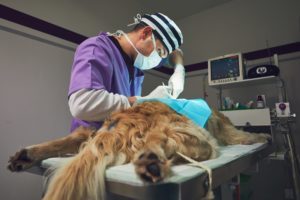
Since it’s Pet Cancer Awareness Month, Alexander Animal Hospital wants to share information regarding osteosarcoma in dogs.
Pet cancer can occur due to different environmental and genetic factors. The more pet owners know, the more they can help their pets with preventative measures. Since it’s Pet Cancer Awareness Month, Alexander Animal Hospital wants to share information regarding osteosarcoma in dogs.
Defining Osteosarcoma
Osteosarcoma is a painful bone cancer typically found in a canine’s larger bones. It’s more common in larger breeds, including Boxers, Dobermans, Weimaraners, Rottweilers, and German Shepherds. Osteosarcomas are tumors that develop from abnormal cell production that make and break down bone. The cancer commonly affects a dog’s hips, pelvis, jaws, and limbs. However, osteosarcoma in dogs can also impact their non-bony tissues, like the kidneys, liver, spleen, and mammary glands.
Clinical Signs
As mentioned, osteosarcoma in dogs is painful. If your canine has cancer in the limb, distinct swelling or lameness may be noted. Your furry companion may be more passive, have a loss of appetite, and be reluctant to walk or play because of pain caused by the tumor on the bone. The most prevalent body areas for osteosarcomas in dogs are the radius or ulna between the wrist and the elbow and the tibia/fibula between the knee and ankle.
Diagnosis
Most dogs with osteosarcoma will limp on the affected limb. Swelling is usually noticeable where the tumor has developed, and the area may be warm due to the extreme inflammation. Your veterinarian will complete X-rays on the areas where osteosarcomas appear. Areas of the bone affected by osteosarcoma will look moth-eaten due to missing bone because of the loss of normal bone tissue. If suspected, a fine needle aspiration will obtain a definitive diagnosis. The vet will put a small needle with a syringe and suction sample cells from the impacted area on a microscopic slide. Your vet might perform histopathology if amputation is chosen.
Treatment
If there is no evidence of metastasis, the primary goal is local tumor control. This typically consists of amputating the affected limb of your dog. Although this process is unsettling for many dog owners, most canines do very well after amputation. Alternatively, surgery is almost always pursued as long as it is safe and provides substantial relief from pain.
Lastly, chemotherapy is usually the best treatment after surgery to help control osteosarcoma in dogs for as long as possible. Other treatment options may be available, too. The prognosis for dogs with osteosarcoma is not good. Without surgical intervention and chemotherapy, a dog’s average lifespan after diagnosis is about six months. Most dogs enjoy a quality life for about a year; some may even live up to two years with amputation and chemotherapy.
Positive Client Testimonials
This is what our satisfied clients had to say about their experience with Alexander Animal Hospital:
“”Dr. Alexander, just a note to thank you for your excellent service and to say that I learned more about my “Sabby” from you in 3 weeks than I did from my old Vet in 3 years! Thanks again for helping me to take good care of my wonderful dog.” Craig A.
“”I first had the honor of meeting Dr. Eric Alexander about 6 years ago and from that moment on I knew that he had a mission on this earth and that was to help animals. He is one of the most caring and compassionate people I have ever met. He was always there for me and my little crew no matter what and for that I will be forever thankful.” Tana D.
Support Your Pet’s Wellness at Alexander Animal Hospital
Alexander Animal Hospital is a full-service animal hospital located in Severna Park, Maryland, serving the Severna Park, Pasadena, and Arnold Areas. Our goal is educating clients on the needs of their pets and understanding the importance of individualized veterinary care in order to strengthen the human-animal bond between owners and their pets.
We understand you have a choice when deciding on the care for your pets, and we strive to provide you with unparalleled services including wellness exams, vaccines, lost pet microchip ID, dental care, surgical services, digital radiography, and in-hospital laboratory services and diagnostics. Other highlights of Alexander Animal Hospital are the separate cat and dog waiting and exam rooms, as well as after-hours on-call emergency services.
Please take a look around our website and then give us a call at 410-777-8678 to set up an appointment. We’re social! Follow us on Facebook, Twitter, and Pinterest for all the latest updates!
